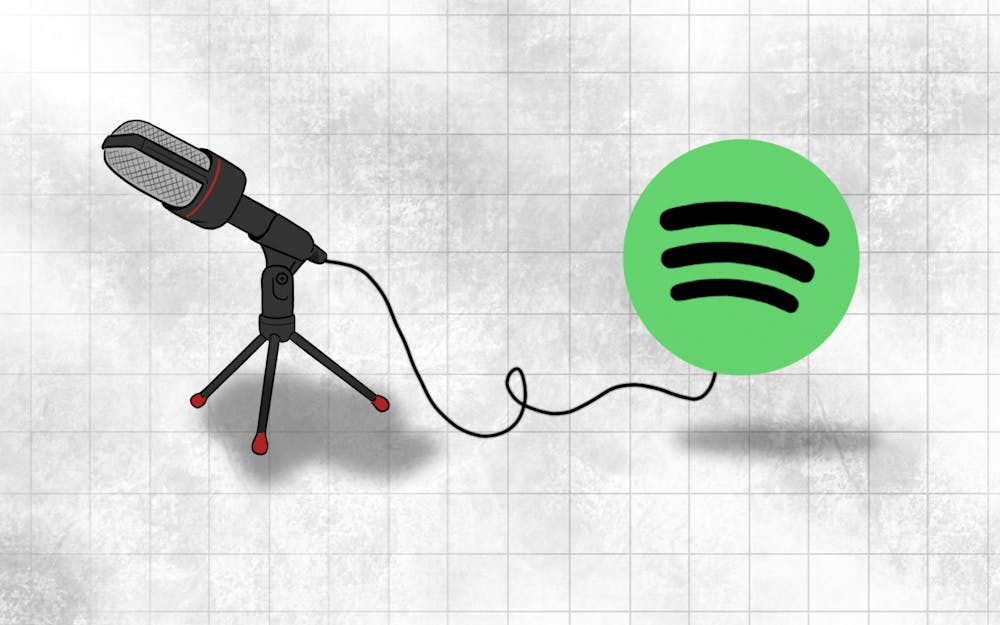Over the last two weeks, Joe Rogan’s podcast, “The Joe Rogan Experience," put Spotify and its business decisions under the spotlight.
It started when Neil Young announced his decision to pull his music off the platform. The move was made in solidarity with more than 270 healthcare professionals who signed a letter to Spotify. The letter called for COVID-19 misinformation to be addressed following Rogan hosting virologist Robert Malone on his podcast.
Twitter banned Malone from its platform in December of last year for posting COVID-19 misinformation. Further criticism was brought against Spotify and Rogan when a compilation video of Rogan saying a racial slur went viral last week.
Other artists soon followed Young’s lead, including Nils Lofgren, Joni Mitchell, India Arie, David Crosby, Stephen Stills and Graham Nash.
“When these heroic women and men, who’ve spent their lives healing and saving ours, cry out for help, you don’t turn your back on them for money and power,” Lofgren wrote in an open letter available on Young’s website. “We encourage all musicians, artists and music lovers everywhere, to stand with us all, and cut ties with Spotify.”
Related: [IU makes no formal commitments after meeting with student climate groups]
The First Amendment to the U.S. Constitution provides protection for freedom of speech, prohibiting the government from monitoring the speech of its citizens. However, Spotify is a private company, meaning the First Amendment does not apply. Instead, the issue comes down to business responsibility, according to Robert Meitus, a Bloomington-based music attorney and adjunct professor of law at IU.
“I do understand a harm is being caused by Joe Rogan’s interviews, but it is a very difficult decision of whether the platform should get in the business of monitoring and making decisions of who can and who cannot speak,” Meitus said.
However, Meitus noted a key difference between access to having content on the streaming platform and Spotify’s promotion of such content.
“I think promoting Joe Rogan with $100 million dollars is different than just allowing him access,” Meitus said. “They are embracing.”
Will IU students and professors be heeding Lofgren’s call to “cut ties with” Spotify? A few have shared their opinions about dropping the popular streaming service.
IU senior Andrew Umana plays bass in a local band called Too Many Cooks. Although a current Spotify user, Umana said he’s looking at other options.
“I’ve been trying my best to assume a vinyl collection and move my music to that, and looking at other streaming services,” Umana said.
Meitus, who uses Spotify everyday, said he is waiting to see how the business reacts.
“It's more important for people to choose whether or not, and I will be deciding whether or not to use the platform going forward based upon if they are a responsible business in our society,” Meitus said, noting how Spotify has helped the musicians he’s worked with. “It would be a shame if we have to see this boycott widen. I hope they pay attention.”
Related: [Graduate workers hold Work-In demonstration for unionization]
John Belser, an audio engineer and lecturer at IU Jacobs School of Music, has engineered an excess of 25,000 works of music for artists in his professional career. Many are on Spotify.
“If you believe that he is spouting misinformation, and you don’t discontinue use of the service, and you don't pull your music, then you are tacitly continuing to support Spotify,” Belser said. “So, you are not holding to your own convictions.”
Belser and other local musicians point to issues with the platform that have existed long before Joe Rogan’s podcast, namely poor sound quality and insufficient artist compensation.
Spotify, like most streaming services, aggregates all their revenue. Music artists don’t receive a certain amount per stream. Instead, the money is divided out amongst the label, who owns the physical recording, and the songwriters, who contributed to the song itself. Typically, the split is 50-50 between the two.
Related: [‘Love, Lani’: the student behind messages of hope around campus]
The most streamed song on Spotify is “The Shape of You” by Ed Sheeran, which has six songwriters including Sheeren himself. If given an equal amount as the other songwriters, Sheeran gets about $1 million of payout for three billion streams.
Comparing this to the $100 million paid out by Spotify to Joe Rogan for his podcast, the contrast is stark.
“It's a straight up insult to musicians,” Belser said. “Think about all these musicians who are spending weeks, months, years, making a crafted musical product that takes tens or hundreds of thousands of dollars to create, a lifetime of experience and practice and slugging it out in the trenches, playing in bars, spending weeks in the studio and they are basically begging for scraps. And here’s Joe Rogan, or any other podcaster, getting paid six or seven figures or more to just ramble on about whatever.”




